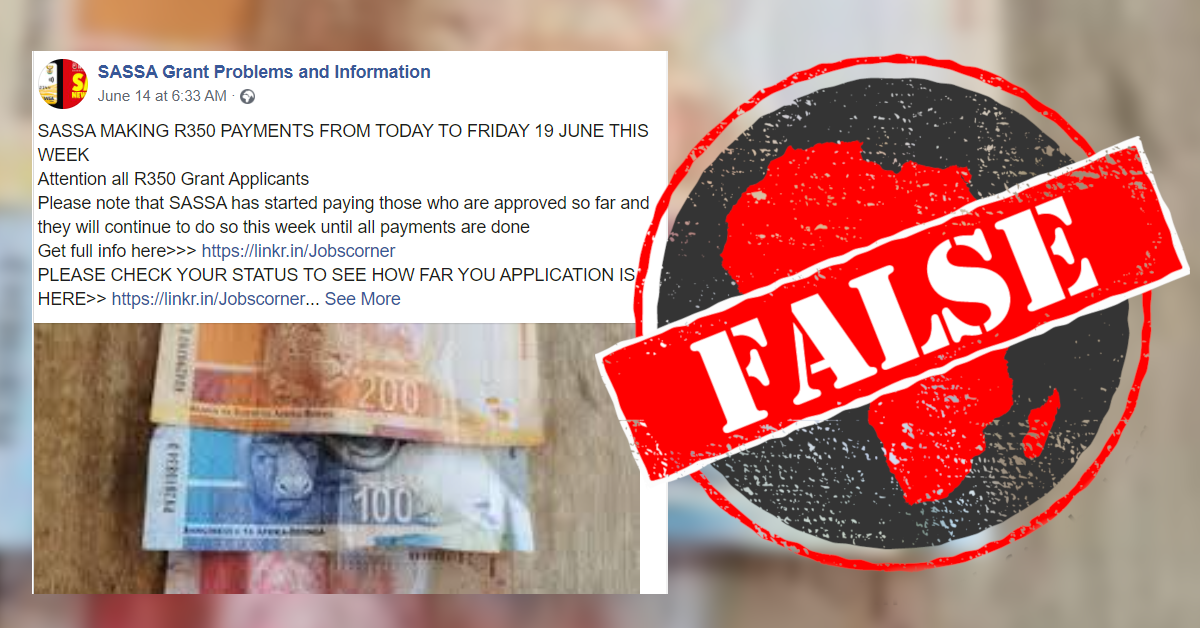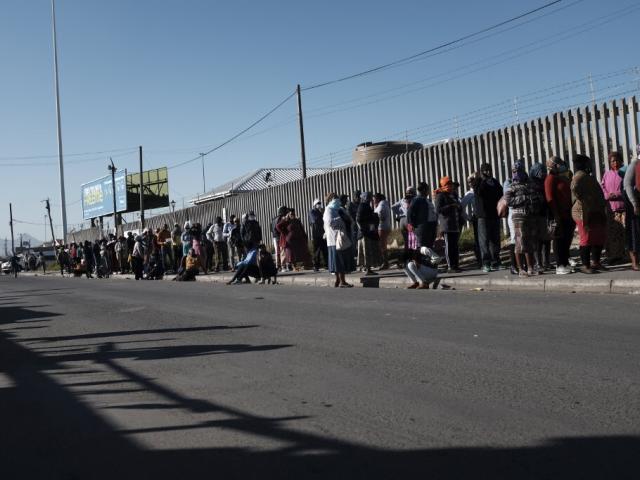The South African Social Security Agency (Sassa) will be “making R350 payments from today to Friday 19 June”, claims a message posted on Facebook on 14 June 2020.
It includes a link to a website where people can “check your status to see how far you application is”.
South Africa has been in strict lockdown since late March 2020 to slow the spread of Covid-19.
Restrictions were eased on 1 June, allowing some businesses to reopen. But many remain closed, and thousands of people are likely to lose their jobs. The government has launched social relief measures to help people through this time, including R350 social relief grants.
The Facebook post claims that Sassa “has started paying those who are approved so far and they will continue to do so this week until all payments are done”.
But its link does not go to the official Sassa website. Instead, it takes you to a web page with a long list of links, each offering different options: one says “R350 Grant Pending Status Explanation”, another says “Check your R350 Grant Application Status Here Now”.
These links go to yet another series of web pages offering different job opportunities. None of the links on the page have anything to do with Sassa’s R350 social relief grant.
The Facebook post is likely clickbait, which tries to lure large numbers of visitors to a website to earn advertising revenue. Africa Check has explored a similar tactic used in job scams.

As of 31 May, 116,867 people had received the R350 social relief grant. A further 666,381 have been approved to receive the payment.
According to the Department of Social Development, people can apply for the R350 social relief grant by submitting their information to Sassa via WhatsApp, SMS or email. Applicants can also phone the call centre on 0800 60 10 11 or visit the official social relief website.
People who have already applied can check the status of their application online or by adding GovChat to WhatsApp on 082 046 8553. Open the chat, type “Status” and send to check the progress. – Africa Check
It includes a link to a website where people can “check your status to see how far you application is”.
South Africa has been in strict lockdown since late March 2020 to slow the spread of Covid-19.
Restrictions were eased on 1 June, allowing some businesses to reopen. But many remain closed, and thousands of people are likely to lose their jobs. The government has launched social relief measures to help people through this time, including R350 social relief grants.
The Facebook post claims that Sassa “has started paying those who are approved so far and they will continue to do so this week until all payments are done”.
But its link does not go to the official Sassa website. Instead, it takes you to a web page with a long list of links, each offering different options: one says “R350 Grant Pending Status Explanation”, another says “Check your R350 Grant Application Status Here Now”.
These links go to yet another series of web pages offering different job opportunities. None of the links on the page have anything to do with Sassa’s R350 social relief grant.
The Facebook post is likely clickbait, which tries to lure large numbers of visitors to a website to earn advertising revenue. Africa Check has explored a similar tactic used in job scams.

Check application status on official website or WhatsApp – not Facebook
As of 31 May, 116,867 people had received the R350 social relief grant. A further 666,381 have been approved to receive the payment.
According to the Department of Social Development, people can apply for the R350 social relief grant by submitting their information to Sassa via WhatsApp, SMS or email. Applicants can also phone the call centre on 0800 60 10 11 or visit the official social relief website.
People who have already applied can check the status of their application online or by adding GovChat to WhatsApp on 082 046 8553. Open the chat, type “Status” and send to check the progress. – Africa Check
Republish our content for free
For publishers: what to do if your post is rated false
A fact-checker has rated your Facebook or Instagram post as “false”, “altered”, “partly false” or “missing context”. This could have serious consequences. What do you do?
Click on our guide for the steps you should follow.
Publishers guideAfrica Check teams up with Facebook
Africa Check is a partner in Meta's third-party fact-checking programme to help stop the spread of false information on social media.
The content we rate as “false” will be downgraded on Facebook and Instagram. This means fewer people will see it.
You can also help identify false information on Facebook. This guide explains how.





Add new comment